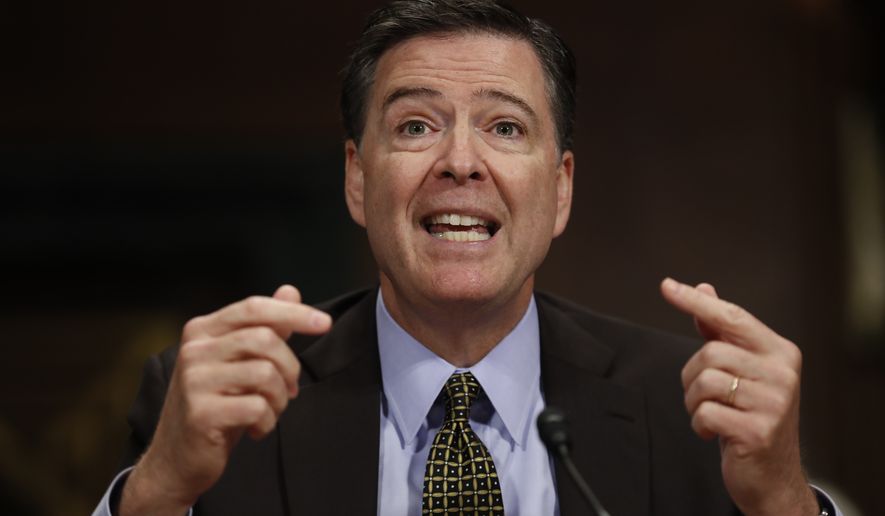FBI Director James B. Comey defended his decision to disclose the reopening of the bureau’s investigation of Hillary Clinton, saying he would do it again even though the thought that his actions affected the outcome of the November presidential election made him “mildly nauseous.”
Mr. Comey on Wednesday offered his most impassioned defense to date of his handling of the Clinton case and the ongoing investigation into suspected ties between President Trump’s campaign and Russian efforts to disrupt the election, as Senate Judiciary Committee members peppered him with questions.
The FBI director said he viewed his options — speaking out or concealing the discovery of emails that could have been relevant to the investigation of Mrs. Clinton’s use of a private server as secretary of state — as a choice between “really bad and catastrophic.”
“Even in hindsight, and this has been one of the world’s most painful experiences, I would make the same decision,” Mr. Comey said. “I would not conceal that.”
On Tuesday, Mrs. Clinton partially blamed Mr. Comey’s last-minute disclosures for her election loss to Mr. Trump.
Less than two weeks before the election, Mr. Comey wrote to Congress to inform lawmakers that the FBI was reviewing Clinton emails that investigators had recovered as part of a separate case: the sexting charges against former Rep. Anthony D. Weiner, the estranged husband of top Clinton aide Huma Abedin.
SEE ALSO: Chuck Grassley questions James Comey, says public faith in FBI has been tested lately
Mr. Comey said Wednesday that Ms. Abedin apparently would forward emails to her husband so he could print them out for her.
A review of the emails was completed just days before the election, and Mr. Comey announced two days before voters went to the polls that Mr. Weiner’s computer turned up no new evidence of wrongdoing on Mrs. Clinton’s behalf. The FBI director received bipartisan criticism.
“You took an enormous gamble. The gamble was that there was something there that would invalidate her candidacy. And there wasn’t,” said Sen. Dianne Feinstein, California Democrat. “Most people who have looked at this say, ’Yes, this did affect the campaign and why would he do it?’”
“I can’t consider for a second whose political fortunes will be affected and in what way,” Mr. Comey said. “We have to ask ourselves what is the right thing to do and then do that thing.”
Mr. Comey in July announced the closure of the Clinton probe and publicly described why the FBI opted not to bring charges against Mrs. Clinton or any of her State Department aides. The FBI director said Wednesday that he took the unusual step because he believed that a June 2016 airport tarmac meeting between Attorney General Loretta E. Lynch and Mrs. Clinton’s husband, former President Bill Clinton, had undermined the Justice Department’s credibility to independently investigate the case.
“A number of things had gone on, which I can’t talk about yet, that made me worry that the department leadership could not credibly complete the investigation and decline prosecution without grievous damage to the American people’s confidence in the justice system,” Mr. Comey told senators.
Senators questioned how Mr. Comey justified his numerous disclosures in the Clinton case with regard to his handling of the probe of Trump associates’ potential ties to Russia — which began before the November election but which the FBI director did not officially confirm until March.
“Both the investigations were open, but you still only commented on one,” said Sen. Patrick J. Leahy, Vermont Democrat.
Mr. Comey said that, in his view, the two investigations received similar treatment.
“With respect to the Russia investigation, we treated it like we did with the Clinton investigation,” he said. “We didn’t say a word about it until months into it, and the only thing we’ve confirmed so far about this, same thing with the Clinton investigation, is that we are investigating. I don’t expect we are going to say another peep about it until we’re done.”
Mr. Comey said he felt he had a duty to inform Congress of the reopening of the Clinton investigation because he repeatedly had told Congress that the case was closed.
“To restart in a hugely significant way, potentially finding the emails that could reflect on her intent from the beginning and not speak about it would require an act of concealment, in my view,” Mr. Comey said.
Rep. Adam B. Schiff of California, the ranking Democrat on the House Permanent Select Committee on Intelligence, said Mr. Comey’s characterization of his choice to stay silent or speak out on the Clinton investigation was disingenuous.
“The real choice the director faced was between abiding by DOJ policy against discussing investigatory matters around an election or ignoring that policy, between consistency in his handling of the two investigations or inconsistency,” Mr. Schiff said. “Regrettably, for the bureau, department and the public interest, the director chose to violate sound policy, taking the path of unjustifiable inconsistency.”
In between questions about the Clinton and Russia probes, Mr. Comey provided testimony about other topics, including the FBI’s surveillance capabilities and updates in recent cases.
Mr. Comey began his remarks by pointing to recent bureau successes, such as the first charges brought against a doctor accused of performing female genital mutilation on girls in the U.S. and the arrest of a man accused of carrying out a series of bomb threats against Jewish organizations.
The FBI director also made his pitch for congressional reauthorization of Section 702 of the Foreign Intelligence Surveillance Act amendments, which allows the attorney general and the National Security Agency to conduct warrantless surveillance of non-U.S. citizens located overseas.
The act is set to expire at the end of the year unless it is reauthorized by Congress.
“702 is an essential tool, and if it goes away, we will be less safe as a country,” Mr. Comey said.
• Andrea Noble can be reached at anoble@washingtontimes.com.




Please read our comment policy before commenting.